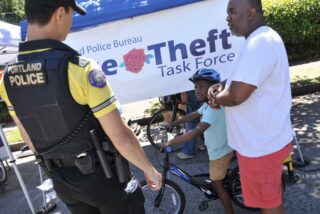
(Photos: Jonathan Maus/BikePortland)
The leader of the Portland Police Police Bureau’s Bike Theft Task Force (BTTF) says the unit has lost its only source of funding and will have to significantly scale back its work for the foreseeable future.
Officers with the task force had been doing regular bike registration events in partnership with Portland Parks rangers over the past few months. Last week Officer Dave Sanders took to the BTTF Twitter account to make the news public: “We are sorry to have to cancel this and other planned events,” he wrote. “Funding for our bike theft program is currently being suspended. Though the police bureau sees the value of these community efforts, we are facing larger budget cuts within our bureau that prevent us from continuing.”
The BTTF was launched in 2015. It was the result of a concerted effort by BikePortland and others to raise awareness of the issue that culminated with the first-ever Bike Theft Summit in December 2014.
Officer Sanders is based out of Central Precinct and works in the bureau’s Neighborhood Response Team (NRT) program. He’s part of a four member unit partly subsidized by Portland Patrol Inc., a private security contractor for Downtown Portland Clean & Safe.

Sanders and his team are on the front lines of several bike theft hot spots and they’ve helped recovered hundreds of bikes over the years. In addition to investigating bike theft cases and getting bikes back, the BTTF has established working relationships with community groups and bike shops, conducted bike theft trainings for officers across the region, and hosted many lock giveaway and registration events. The BTTF is also active online. Sanders has hosted a Q & A in the BikePortland Forums and regularly responds to requests for help through the BTTF Twitter account.
Other steps the BTTF has taken to fight bike theft include setting out bait bikes and setting up stings to intercept online sales of stolen bikes.
Between January 1st and August 31st of this year, the BTTF recovered 192 bikes. In 2018 the BTTF confiscated 277 bikes and returned 223 (74%) of them to their rightful owners.
Advertisement

(Source: Portland Police Bureau)
Sanders estimates there are about 10,000 bicycles stolen in Portland ever year (only about 1 in 4 get reported). He believes the best way to combat this epidemic — which he claims has gotten far worse during the pandemic — is for every bicycle to be registered with a service like Project 529 (which the bureau relies on heavily) or Bike Index. Sanders says you’re twice as likely to get your bike back if it’s registered. The goal of the BTTF was to register 100,000 bikes by 2022 — 10 times the amount currently on file.
Despite the success of the BTTF, it has never received dedicated funding from the Portland Police Bureau beyond limited officer staff time. That changed in 2018 when Sanders applied for — and won — an internal grant for $180,000 to do community outreach and boost bicycle registration. The grant money initially came into the bureau in 2017 through the federal Edward Byrne Memorial Justice Assistance Grant (JAG) Program. Sanders earned a share of that money with his proposal for a three-year Bicycle Outreach Program that centered on registration drives, community education efforts, and other efforts to get a handle on thefts.
Sometime earlier this month Ofcr. Sanders was told that money would no longer be available. He believes the funds were shifted to other bureau priorities and that the move was a result of an overall drain on the police budget and to recoup costs from protest response efforts.
PPB officials haven’t responded to requests for comment about this decision.
The PPB budget has been in major flux all summer and the NRT program is a victim of cuts throughout the bureau. The primary source of funding for the PPB’s NRT program is General Fund discretionary resources which the current city budget says are, “subject to the volatility of the City’s General Fund.”
Back in June, the police budget was reduced by $15.3 million — from $244.6 million to $229.3 million — for the 2021 fiscal year (which runs from July through June). The bulk of these cuts were the result of public and political pressure to reduce police spending and redirect it to other public services.
Also in June, The Oregonian reported the bureau is required to make another $3.3 million in cuts as part of a citywide response to coronavirus impact. “It’s not yet clear where those reductions will be,” they wrote.
According to KATU, the police budget is also under strain from a huge spike in overtime related to the protests. The PPB has also spent over $70,000 on weapons like tear gas and pepper spray as well as new protest-related equipment. Another $40,000 was spent on fencing around Chapman and Lownsdale squares that was taken down after just a few days.
“I would love for someone else to step up in the community to solve this problem.”
— Dave Sanders, PPB officer
Sanders says the BTTF isn’t being dissolved and that he and other members of the Central Precinct bike unit will still be able to do bike theft work during down-time; but he doesn’t expect that to happen much given their intense workload. In addition to having his funding rescinded, two of the six bike unit positions have been cut.
While he’s disappointed to lose so much of the progress the BTTF has made in the past five years, Sanders says, “I don’t take it personally. The bureau acknowledges that this was a vital program and valuable services provided to the community. I hope that the city as a whole again prioritizes this again in the future. I want people to know we still care about bike theft and are still active in getting bikes back as we can. We just won’t be able to be as responsive to the community’s needs.”
When Sanders started working on bike theft issues in 2013 he says he did it because he saw a huge need and no one else was stepping up to do anything about it.
Advertisement
With the role of police in our communities under intense scrutiny, many people wonder why bike theft recovery and prevention work is being done by armed officers at all. “I would love for someone else to step up in the community to solve this problem,” Sanders shared with me recently.
Sanders has had the help of a few community partners over the years. He tried for months in 2018 to get a paid position established at the Portland Bureau of Transportation to take over many aspects of the work. PBOT wasn’t able to justify the position in their budget, but the agency has played a big role in the BTTF since its inception. They partner on marketing and promotional campaigns and PBOT has purchased 100s of u-locks for giveaways at events like Sunday Parkways.
The best way to combat bike theft is to get more bikes registered and educate people about using high-quality locks — neither of which require a police officer. Sanders thinks even some of the background investigation work could be done by a civilian.
When it comes to contact with bike theft suspects though, Sanders believes armed officers are a must. “That’s our function, to be that mediator between the community and the suspect who might cause harm,” he said.
When the BTTF launched in March 2015, former Police Chief Larry O’Dea said, “I want to make it clear that this has been community-driven effort from the start and it will continue to be an equal partnership with the public.”
With reported bike theft cases up nearly 20% compared to last year and the suspension of the BTTF, the public will have to step up more than ever to address the issue.
— Jonathan Maus: (503) 706-8804, @jonathan_maus on Twitter and jonathan@bikeportland.org
— Get our headlines delivered to your inbox.
— Support this independent community media outlet with a one-time contribution or monthly subscription.

